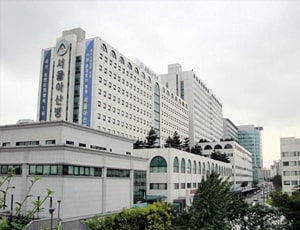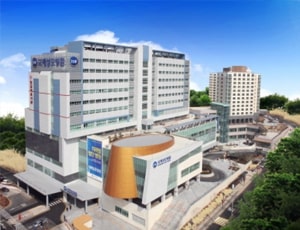The average cost of Brain Cancer Treatment in Seoul approximately starts from USD 30000
Treatment cost

Asan Medical Centre located in Seoul, South Korea is accredited by ISO. Also listed below are some of the most prominent infrastructural details:


International St. Mary's Hospital located in Seoul, South Korea is accredited by JCI. Also listed below are some of the most prominent infrastructural details:
The term "brain cancer" describes the abnormal development of brain cells that result in a mass or tumor. It can interfere with normal brain functions such as speech, movement, thoughts, feelings, memory, vision, and hearing. It is a disease of the brain in which abnormal, cancerous cells grow in the brain tissues. Typically, brain cancer is a developed form of a brain tumor. Primary brain cancer or a brain tumor develops from cells within the brain.
However, all brain tumors are not brain cancer. But one thing to note is that even benign tumors can cause serious problems by increasing intracranial pressure or obstructing vascular structures or cerebrospinal fluid flow in the brain.
Different types of cells in the brain such as gliomas, meningiomas, pituitary adenomas, vestibular schwannomas, and primitive neuroectodermal (medulloblastomas) can become cancerous. Gliomas have several subtypes, which include astrocytomas, oligodendrogliomas, ependymomas, and choroid plexus papillomas.
Brain Cancer Causes
The exact brain cancer cause is still unknown. However, its occurrence has been linked to several risk factors, including the following:
There are two types of brain cancer, including:
Metastatic cancer in the brain is more common than primary brain cancer. They are usually named after the tissue or organ where cancer first develops. Metastatic lung or breast cancer in the brain is the most commonly found brain cancer.
Brain Cancer: Grades
Tumors of the brain are assigned under a grade, depending on how normal or abnormal the cells appear microscopically. Grade measurements will help your doctor plan the most suitable treatment for you.
The brain cancer treatment plan is prepared by a medical specialist, who takes note of the cancer type, location, tumor size, patient age, and general health status before coming up with an individualized treatment plan. Typically, brain cancer treatment options include the following:
Ask your healthcare adviser for the best multiple options and choose the one that meets your expectations
The minimum cost of Brain Cancer Treatment in Seoul is about $30000. In Seoul, Brain Cancer Treatment is conducted across many multispecialty hospitals.
The Brain Cancer Treatment package cost in Seoul varies from one hospital to another and may offer different benefits. There are many hospital who cover the cost of pre-surgical investigations of the patient in the treatment package. The comprehensive Brain Cancer Treatment package cost includes the cost of investigations, surgery, medicines and consumables. Post-surgical complications, new findings and delayed recovery may have an impact on the total Brain Cancer Treatment cost in Seoul.
Many hospitals in Seoul perform Brain Cancer Treatment. For quick reference, the following are some of the leading hospitals for Brain Cancer Treatment in Seoul:
After Brain Cancer Treatment in Seoul, the patient is supposed to stay in guest house for another 25 days. This duration of stay is recommended to complete all the necessary follow-ups and control tests to ensure that the surgery was successful.
Apart from the Brain Cancer Treatment cost, there are a few other daily charges that the patient may have to pay. The per day extra expenses in Seoul per person are about 40 USD.
The patient has to spend about 5 Days in the hospital after Brain Cancer Treatment for proper recovery and to get clearance for discharge. The patient is subjected to several biochemistry and radiological scans to see that everything is okay and the recovery is on track. After making sure that patient is clinically stable, discharge is planned.
There are around 2 Hospitals hospitals in Seoul that offer Brain Cancer Treatment to international patients. These hospitals have the required infrastructure and a decided Brain Cancer Treatment unit where renal failure patients can be treated. Apart from good services, the hospitals are known to follow all standard and legal guidelines as dictated by the local medical affairs body or organization.
Some of the most sought after doctors for Brain Cancer Treatment in Seoul are: